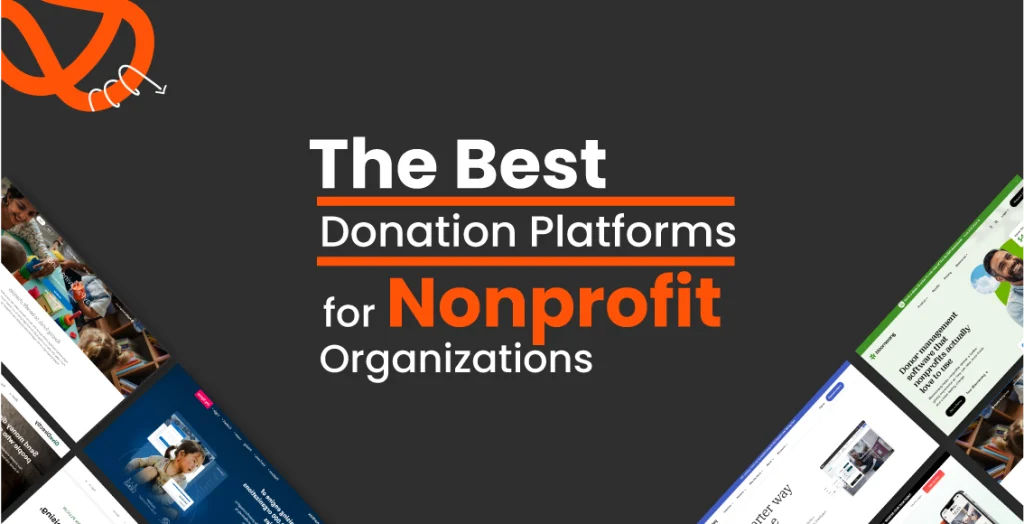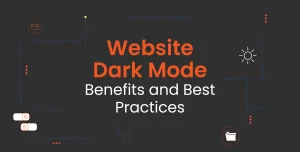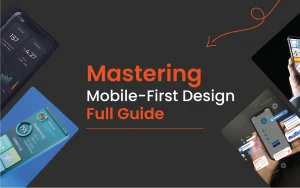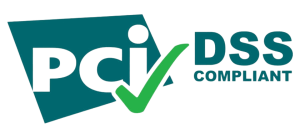Introduction: How to Get a Consistent Flow of Donations
Whatever the mission and history of your nonprofit organization, your impact often relies on the donations you get to support your cause. One of the best practices to help you have a consistent flow of donations is having a solid, secure, and user-friendly donation solution. In this article we will help you achieve your goals and have more impact by analyzing the features and benefits of the best donation platforms for nonprofit organizations to help you choose the one that fits your needs and boost your success.
A donation platform is an online service with a wide range of features and tools that aim to simplify the donation process for both your organization and your donors.
By the end of reading this article you will get detailed answers to the following questions:
- What exactly is a donation platform?
- Why do nonprofits need it?
- The Differences between donation platforms and the regular payment gateways.
- How to choose the best donation platforms for nonprofit organizations?
- What are the best donation platforms for nonprofit organizations in 2024?
- How to implement your software into your nonprofit website?
- What systems can integrate with donation platforms for nonprofit organizations?
- How to strategically use your donation software to encourage supporters to donate and leverage them in your marketing campaigns?
Now, let’s start:
What’s a Donation Platform?
It is an online service which includes various tools that facilitate the process of collecting and managing the donations. These software are built and designed specifically for nonprofits.
There are plenty of donation solutions in the market. Each comes with some unique features and tools. But most of them have the essential features and functionalities you need.
But before starting comparison between different options and how to select the best one, it’s essential to dive deeper into the benefits that you’ll reap by leveraging the power of donation platforms.
Why Do Nonprofits Need a Donation Platform?
There are many reasons why your nonprofit organization should consider implementing a donation platform:
a. Convenience and Accessibility:
These software come with various donation options and payment methods. This makes it so convenient for almost everyone in your audience to select the best way for him to complete the donation process with ease at any time, from their mobile device or laptop, from anywhere in the world.
b. Seamless Donation Experience:
Imagine that an interested donor reaches your website trying to make a donation, but because of the complexity or unclarity of the process, they just leave! You don’t want this to happen to your organization. That is why a smooth and simple donation process is crucial.
c. Automated Processes:
One of the most important steps of the donation process are issuing tax receipts and tracking donations. If you would go through these steps manually, you would need to invest a lot of time and effort in them while being prone to making mistakes.
The automation features do most of the repetitive and administrative work for you by issuing the receipts and tracking the donations on auto-pilot.
d. Data Collection and Analysis:
One of the best practices you can follow to maximize your impact and the donations your nonprofit receives is collecting the donations data and analyzing them.
This will enable you to generate valuable insights about your campaigns, what’s working and what’s not, your audience’s behavior, what channel drives the majority of your donations… etc.
e. Recurring Donations:
A valuable feature of donation platforms is enabling donors to create a recurring donation. This feature ensures you have a consistent donation flow. Also, for the donors, they would feel much better not to put the same amount of effort needed for the first donation every time they want to donate.
e. Integration with Other Systems:
They can easily be integrated with most nonprofit organization systems like CRMs, emails, marketing tools, and social media. This is a very convenient way to leverage the power of the platform and receive donations from multiple channels while tracking every donation through your CRM or ERP.
g. Security and Compliance:
They have robust security technology that keeps your donations and your donors data safe. Also, their procedures of security are compliant with all the required regulations.
h. Brand Building and Trust:
Without proper branding and people perceiving your nonprofit organization as trustworthy, you won’t find as much success when collecting donations.
One of the key features of donation software is the customization that keeps everything aligned with your brand theme and identity. This helps you be seen as a credible organization that your audience can trust.
i. Global Reach:
If you have a global audience, not just local supporters, your platform allows you to receive payments from anywhere. You can even manage different currencies if your organization is multinational.
j. Cost-Effectiveness:
Investing in a donation solution can dramatically reduce overhead costs while increasing the fundraising efficiency. Making it such a great cost-effective solution that accelerates your organization’s success.
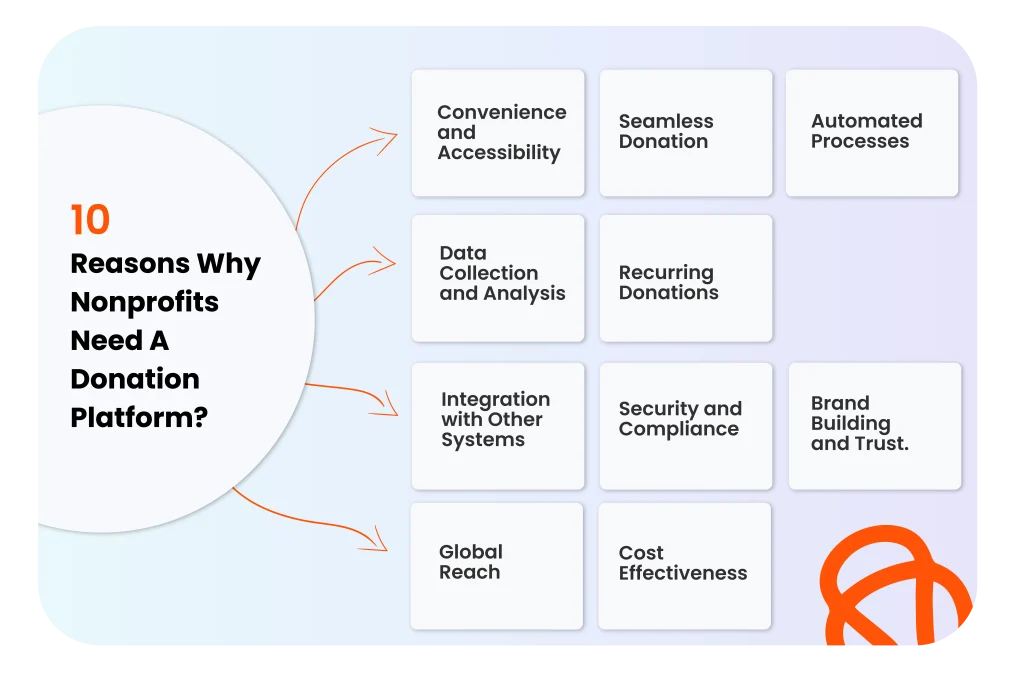

The question that may pop to your head now is:
Why doesn’t your nonprofit organization just use any other payment gateway to receive donations?
That’s a great question. To answer it, let’s discuss the:
Differences Between Donation Platforms and Regular Payment Gateways:
a. Tailored Features:
Donation platforms are built and designed especially for nonprofit organizations with their needs in mind. That’s why they offer features that regular payment gateways may lack such as recurring donations, donor management, and campaign tools.
b. Donor Management and CRM Integration:
This allows your nonprofit organization to track donors information, their donation history and engagement. Plus you can store and recall this data in your CRM through a seamless integration.
c. Fundraising Campaign Tools:
These platforms come with many tools to help you create and manage fundraising campaigns, events, peer-to-peer fundraising, and crowdfunding.
d. Customizable Donation Forms:
Donation platforms offer highly customizable and branded donation forms that you can embed on your nonprofit website and share them to your social media pages and email campaigns. These forms help you get much better donor engagement.
e. Communication and Engagement Tools:
Many donation platforms have built-in tools that you can leverage for thanking donors after their donation. Also, you can keep them updated with your latest news and updates.
f. Reporting & Analytics:
Donation solutions provide you with detailed reports and analytics on donor demographics, donation trends, and your campaign performance. These tools allow your nonprofit to gain valuable insights and optimize your fundraising strategies and scale what works best for you.
In summary, using a donation platform for nonprofit organizations is a much better solution than a typical payment gateway. Due to all the features and tools that are built specially to help the nonprofits maximize their donations while providing a seamless experience for their donors and receive their support for a long time.


So, among all the available options in the market, the question is:
How to choose one of the best donation platforms for nonprofit organizations?
You need to take into consideration many factors that will help you decide. Let’s talk about the most important ones:
a. Security:
Security is the most important element for your donors to trust you and to complete their donation process. So, ensure your choice is PCI-compliant and has SSL encryption for secure transactions. This practice helps you stay aligned with the required regulations.
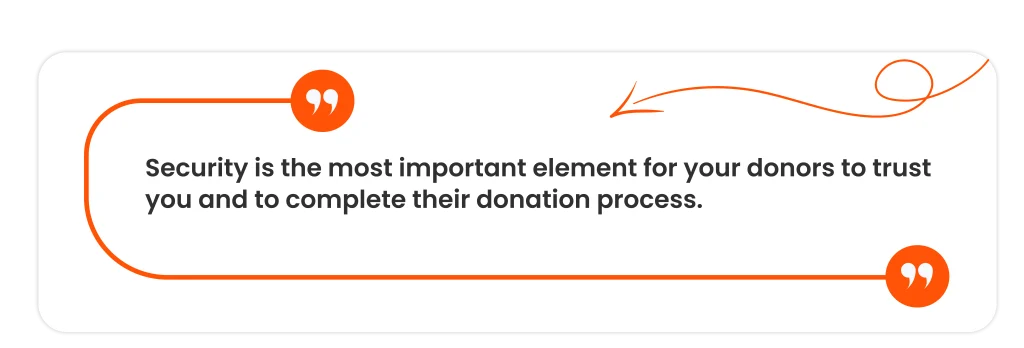

b. Flexibility:
It’s essential for you to provide various payment methods to your donors so you can get support from a wide range of your audiences from anywhere in the world. So, when it comes to choosing the best donation platform for your nonprofit, select a software that provides such flexibility to provide a seamless donation experience to your donors and ensure they can always return to support you.
c. User Experience:
A user-friendly, clear, and easy-to-navigate solution is a must if you want your donation processes to be simple and straightforward. So make sure to select a one with a simple interface that encourages your donors to donate.
d. Integration Capabilities:
To leverage the full power of your donation process, you need to choose a software that’s compatible with your systems like CRM, email marketing tool, ERB or accounting system. This compatibility will ensure you save time of tracking the donations, managing the process and gaining deep insights.
e. Cost-effectiveness:
Investing in a donation solution is crucial for you to have all the benefits of its features. However, you need to select a software with transparent pricing plans and implementation costs that align with your budget.
f. Support and Training:
No matter how simple the platform you choose is, it must have robust support services. Don’t expect to figure out how every feature and tool works, and definitely do not expect to face no issues with your new software. Every piece of tech is prone to some sort of issues. So, having an available and well trained support team will be a great advantage.
g. Mobile Optimization:
According to Statista, mobile devices drive approximately half of web traffic worldwide. You can expect more than 50% of your online donors to be using their mobile devices to make a donation. Ensure your donation page is responsive to various mobile devices and sizes and supports mobile payments.
h. Follow-Up and Engagement tools:
Choose a software that enables you to automate your engagement messages to your audience. Whether it’s a thank-you email, a message with your impact updates, or offering recurring donation options. This would increase your engagement, save you a ton of time of manual follow up or even managing this process directly from your marketing tools.
Now let’s discover…
The Best donation platforms for nonprofits in 2024:
a. Classy:
| Security | PCI-DSS compliant, data encryption |
| Payment Methods | Credit cards, ACH transfers, Apple Pay, Google Pay |
| User Experience | User-friendly interface, drag-and-drop editing |
| Integration Capabilities | Integrates with CRM, email marketing tools |
| Cost-effectiveness | Starts at $299/month |
| Support and Training | 24/7 live chat and phone support, comprehensive training materials |
| Mobile Optimization | Responsive design for mobile devices, mobile donation app |
| Follow-Up & Engagement | Email marketing tools, donor segmentation |
| What’s unique about Classy? | Classy is known for its versatility and broad range of payment methods. Ideal for nonprofits looking for a robust, all-in-one platform. |
b. Tithley:
| Security | PCI-DSS compliant, SSL encryption |
| Payment Methods | Credit cards, ACH transfers, text giving |
| User Experience | User-friendly interface, mobile app |
| Integration Capabilities | Integrates with CRMs, accounting software, and email marketing tools |
| Cost-effectiveness | Starts at $19/month |
| Support and Training | Live chat support, training materials, webinars |
| Mobile Optimization | Fully optimized for mobile devices, mobile app |
| Follow-Up & Engagement | Automated thank-you emails, donor segmentation, engagement tracking |
| What’s unique about DonorPerfect? | It has a strong focus on mobile giving and text donations |
c. GiveDirectly:
| Security | PCI-DSS compliant |
| Payment Methods | Credit cards, debit cards, mobile wallets |
| User Experience | Streamlined donation process |
| Integration Capabilities | Limited integrations |
| Cost-effectiveness | Free, relies on platform fees (10%) |
| Support and Training | Limited support options |
| Mobile Optimization | Mobile-optimized donation process |
| Follow-Up & Engagement | Limited follow-up tools |
| What’s unique about GiveDirectly? | Focuses on direct impact donations with a streamlined process, making it unique for direct donation models. |
d. PayPal Giving Fund:
| Security | PCI-DSS compliant |
| Payment Methods | Credit cards, bank transfers (limited) |
| User Experience | Simple and familiar for donors |
| Integration Capabilities | Integrates with popular fundraising platforms |
| Cost-effectiveness | Free, platform retains a small percentage (0.5-1.5%) |
| Support and Training | Reliant on PayPal’s support resource |
| Mobile Optimization | Optimized for mobile giving |
| Follow-Up & Engagement | Basic email marketing tools |
| What’s unique about PayPal Giving Fund? | Familiar and simple for donors, leveraging PayPal’s widespread recognition and ease of use. |
e. Bloomerang:
| Security | PCI-DSS compliant, SSL encryption |
| Payment Methods | Credit cards, ACH transfers, recurring donations |
| User Experience | Streamlined for in-kind donations, parent-focused |
| Integration Capabilities | Integrates with popular CRMs, email marketing tools, accounting software, and social media platforms |
| Cost-effectiveness | Starts at $99/month |
| Support and Training | Extensive knowledge base, webinars, live chat support, phone support during business hours |
| Mobile Optimization | Fully responsive design for mobile devices, mobile-friendly donation forms |
| Follow-Up & Engagement | Automated thank-you emails, donor segmentation, engagement scoring, comprehensive reporting and analytics |
| What’s unique about Bloomerang? | Perfect in donor engagement with features like engagement scoring and comprehensive reporting. |
f. Donorbox:
| Security | PCI-DSS compliant |
| Payment Methods | Credit cards, ACH transfers, recurring donations, cryptocurrencies |
| User Experience | User-friendly interface, easy setup |
| Integration Capabilities | Integrates with popular CRMs and marketing tools |
| Cost-effectiveness | Freemium, paid plans start at $10/month |
| Support and Training | Live chat, email support, knowledge base |
| Mobile Optimization | Responsive design, mobile-optimized donation forms |
| Follow-Up & Engagement | Email marketing tools, donor segmentation |
| What’s unique about DonorBox? | Offers easy setup and user-friendly forms, making it ideal for small to mid-sized nonprofits looking for simplicity and functionality |
g. GiveWP:
| Security | PCI-DSS compliant, SSL encryption |
| Payment Methods | Credit cards, PayPal, bank transfers |
| User Experience | User-friendly, designed for WordPress websites |
| Integration Capabilities | Integrates with WordPress plugins, CRMs, and email marketing tools |
| Cost-effectiveness | Free with paid add-ons starting at $15/month |
| Support and Training | Extensive documentation, community support, priority support for paid users |
| Mobile Optimization | Fully responsive design for mobile devices |
| Follow-Up & Engagement | Automated thank-you emails, donor management, reporting tools |
| What’s unique about GiveWP? | Designed specifically for WordPress, highly customizable |
In summary, choosing any of the best donation platforms for nonprofit organizations depends mainly on your needs:
Broad and variable needs: Classy and Donorbox will be the optimal choice for you, thanks to their extensive features and strong integration capabilities.
Mobile and text giving focus: Tithely is an excellent choice due to its focus on both mobile giving and text donations.
Simple and familiar experiences: PayPal Giving Fund is simple and integrates easily with your systems and it’s very familiar for both donors and nonprofits.
Direct impact-focused donations: GiveDirectly is your go to, however it offers limited customization and integration options.
Powerful donor engagement: Bloomerang is the best choice by far due to its features like engagement scoring and comprehensive reporting, making it a strong tool for donor management.
WordPress users: GiveWP is a tool designed specifically for WordPress that offers highly customizable donation forms and integrations with a lot of WordPress plugins.
Overall, your choice depends on your nonprofit organization’s specific needs, such as the type of donation you expect, your fundraising campaigns’ complexity, and your integration requirements.
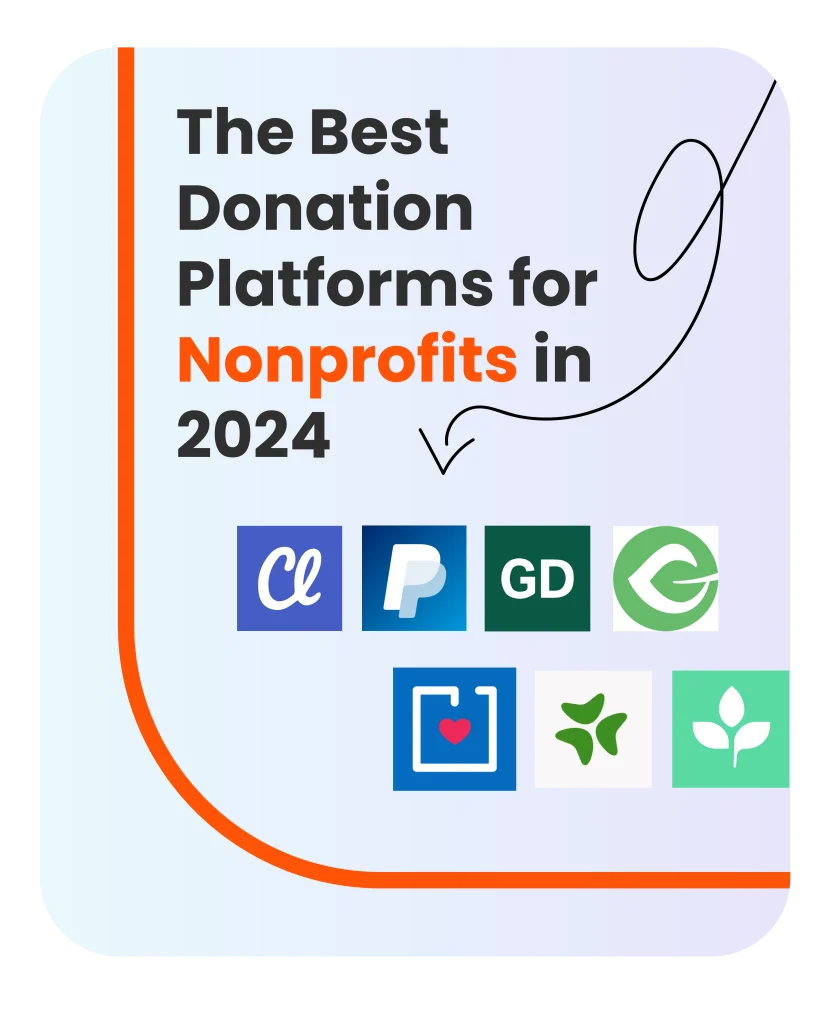

After choosing the best donation platform for your nonprofit. It’s time to implement it into your website.
How to Implement Your Solution into Your Nonprofit Website?
a. Create your organization account:
Start off by signing up and creating an account for your organization. Make sure to feed all the required contact information to ensure proper future communication with the platform support team and yours.
b. Set Up Donation Forms:
The very first thing you need to do after your account verification is setting up your donation forms. Leverage the customization features to apply your brand theme, suggest donation amounts, and select the donor information fields.
c. Generate Embed Codes:
Most donation platforms provide embed codes for your donation forms after customization. So, you will need to generate the code to be able to embed the form in your website.
d. Add the Code to your website:
Now, you or your web development team need to go ahead and paste the generated code into the HTML section of the page where you want your donation to appear on your website. You can embed the code in multiple locations on your website. [In the next section, we will discuss where and how to place your donation forms on your website for maximum engagement]
e. Set up Payment processing
After you embed the code correctly, you’ll need to configure the payment processing settings and link your organization’s bank account to be able to receive the donations.
f. Testing:
After embedding your donation forms and placing it strategically on your website, you’ll need to test the functionality, responsiveness and quality of the forms.
Now, let’s leverage the full power of your donation software…
What systems can you integrate with your donation platforms?
Before launching any fundraising campaigns, you need to set up all the essential integrations so you can make the best use of all its features.
Investing time and effort to integrate your software will save you a lot of time and effort in the future.
Let’s discover what systems to integrate and how you can integrate them.
a. Integration with your CRM:
- Check compatibility: ensure that your donation software is compatible with your CRM for example; Salesforce or Hubspot.
- API Keys and Authentication: You must obtain API keys from both your donation platform and CRM. Then follow the authentication procedures to link the two systems together.
- Mapping Fields: Properly map the fields between the software and your CRM to ensure data flows correctly to your CRM for example: donor name, email, country, donation amount.
- Automated Sync: Set up an automated synchronization to ensure that new donations are reflected in your CRM and automatically update your donors’ profile information in real-time.
b. Integration with your email marketing software:
Same way as CRM, you can connect your software with your email marketing tool (e.g., Mailchimp, Constant Contact) so you can automatically add donors to your mailing lists, categorize them and add tags to them.
Also, you can create automated email workflows to send immediate thank-you emails to you donors, update them with your impact status and activities, and future milestones based on their interests, demographics, and donation behaviors.
c. Integration with Accounting Software:
Integration with accounting software (e.g: QuickBooks) is as important as the integration with your CRM so you can automatically, and accurately, record the donations and reflect them to your financial reporting.
d. Integration with Analytics Tools and Social Media
To shorten and simplify your marketing funnels, you can integrate the donation software’s built-in tools to share campaigns directly on social media and track the engagement.
Not only this, you can also integrate your donation solution with Google Analytics to track traffic and conversions on each one of your donation pages.
Finally, after selecting the best donation platform for your nonprofit organization, embedding it in your website, and integrating it with all your systems, let’s strategically use it in our marketing campaigns:
How to Leverage Your Donation Software in Your Marketing Campaigns to Maximize Your Donations?
There are many ways to leverage the donation platforms for nonprofit organizations in your marketing campaigns but we are going to focus on only three ways that you can easily and immediately use:
a. Email Marketing and Automations:
Emails are the best way for marketers to communicate effectively with their audience. Donation platforms make it even easier for you to collect donations through emails and empower your relationship with your donors.
The easiest way to start collecting donations is by adding your donation form’s link directly into any text or image in your emails and direct your audience to click it so they can donate in a few simple steps.
Furthermore, you can set up an autoresponder email to thank your donors automatically after they donate.
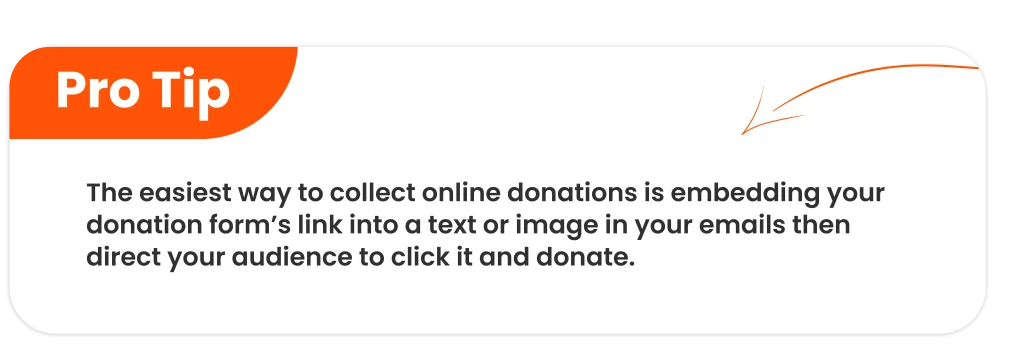

b. Social Media:
Many solutions enable you to embed a donation widget directly to your social media accounts like Facebook, X, and Instagram using an integration tool. These widgets give you high exposure to potential donors on these social media channels.
c. Partnerships Campaigns:
One of the best and most commonly used ways to gain new donors and supporters is to leverage another business’s audience. If you have partnered with any organization or secured a sponsor for your cause, you can organize a co-branding campaign that puts your nonprofit’s story in front of that business’s audience. By sharing your donation forms in these campaigns, you will likely gain many new donors and recurring supporters.
Conclusion: Now, You Know What to Do!
In summary, your success and impact as a nonprofit organization are deeply relevant to your ability to get consistent donations. Choosing a proper solution is crucial to support your fundraising efforts in an efficient, secure, and user-friendly way. In this article we provided a comprehensive analysis of the best donation platforms for nonprofit organizations that we recommend at Orthoplex Solutions for our clients for 2024, with a focus on their unique features and benefits to help you make a decision.
By understanding what a donation platform is, its importance for your nonprofit organization, and how it is different from the regular payment gateways, you are able to choose an ideal option that fits your nonprofit organization’s specific needs.
Moreover, you have discovered how to implement the software into your website and integrate it with your systems to streamline and simplify your operations. And finally, how to strategically leverage your donation solution in your fundraising campaigns through emails, social media, and partnerships.
Ultimately, choosing the right donation platform will simplify the donation process for your donors, increase your engagement, and empower your organization to make a greater impact in the world all while ensuring a steady flow of support.

